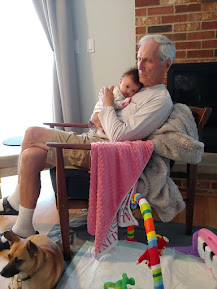A time to be born, and a time to die. ( Ecclesiastes 7:17 ): — The verse has two parts: "There is a time to be born; and a time to die": and it seems as if a person has as little control over the one as over the other — over the day of one’s death as over the day of birth.
Recently we have observed both the passing of old friends and the birth of a new baby into our this world, and these events cause me to ponder what is most important in life. And to relish life itself, knowing that we are but sojourners for awhile on this earth.
Jim Bergquist was the pastor in Honolulu when he and wife Lorrie greeted me as I arrived for graduate school in 1963. After long and fruitful lives they died earlier this year, their passing separated only by a month. There will be a joint funeral service tomorrow to commemorate their lives. I haven’t heard of that happening before.
Their life journeys have some similarities to ours in that they served the church in many places in the US and abroad. Jim was a great theologian and scholar who held leadership positions in the Church and taught in seminaries in various Asian countries, including four years in India teaching at Gurukul Theological Seminary in Madras, India.
On the other end of life we rejoice in the birth of our second great-grandchild, Lyonna Velgach on April 28th, the second child born to our granddaughter Leslie and her husband Filipp. We held a family gathering in Chicago in June with all three of our children, all but one of our six grandkids, and two great-grandchildren. It gives us a wonderful appreciation for the continuity of the generations as we look back at our path taken in life and see the paths taken by each of our offspring, both affirming and diverging from ours.
Jim and Lauri leaving Hawaii in 1964.
One of our last visits with Jim and Lauri when they treated us to Indian food in Minneapolis, Dec. 2016.



